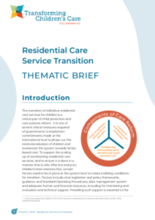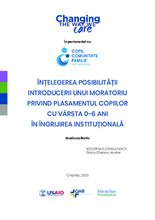Displaying 41 - 50 of 10185
The survey results presented in this report highlight increasing efforts by states, the District of Columbia and Puerto Rico to promote kinship care and support the caregivers of children who are known to the child welfare system. At the same time, the report calls on states to do more to help willing kin caregivers access and benefit from foster care licensing.
In this article, the authors present considerations related to the global mandate for child protection and the challenges that persist amongst marginalized communities. Subsequently, they focus on Canada and, in particular, the Ontario example: the trends from the Ontario Incidence Study of Reported Child Abuse and Neglect (OIS). This child welfare epidemiological project has highlighted the need for greater intersectional adjustments to best protect children, where the iterative research-policy cycle has most effectively been seen with a formal system for the inclusion of lived experience, as in the case of Indigenous peoples.
The long-term consequences of COVID-19 have been tough for children around the world, but even more so for young children already in humanitarian crises, whether due to conflict, natural disasters, or economic and political upheaval. Drawing on research and voices from the Global South, this book showcases innovations to mobilize new funds and reallocate existing resources to protect children during the pandemic.
This cross-sectional study was conducted in 24 Lithuanian schools and involved parents/caregivers and their children aged 12 to 17. The study aimed to collect and analyse self-reported data on left behind children's emotional and behavioural problems and compare children’s reports with those of parents/caregivers.
This article delves into the challenges faced by orphans in Nigeria, specifically focusing on their psychological development and overall welfare. The article advocates for a family-centric approach, which includes adoption, community-based upbringing, and initiatives to strengthen existing families.
The goal of this study is to examine the relationship between caregiver characteristics, caregiver attachment and placement type on two dimensions of mental health and substance use among a sample of older youth living in care in Ontario, Canada.
This webinar examined care in the context of COVID-19, climate change, and conflict. Speakers explored how the pandemic has left a lasting legacy on the care system in Uganda and examined the impacts of climate change-related drought on children's care in Kenya. They also explored efforts to deliver effective care for children during conflict in Ethiopia.
This brief contains high-level guidance and recommendations for policy and decision-makers and development partners to consider in designing frameworks to scale up, coordinate and support the transition of individual residential care services.
This report provides an updated data-driven assessment of female genital mutilation (FGM) around the world. It narrates through numbers the stories of millions of girls and women who have survived the practice and the millions more who remain at risk.
Programul Național pentru Protecția Copilul








